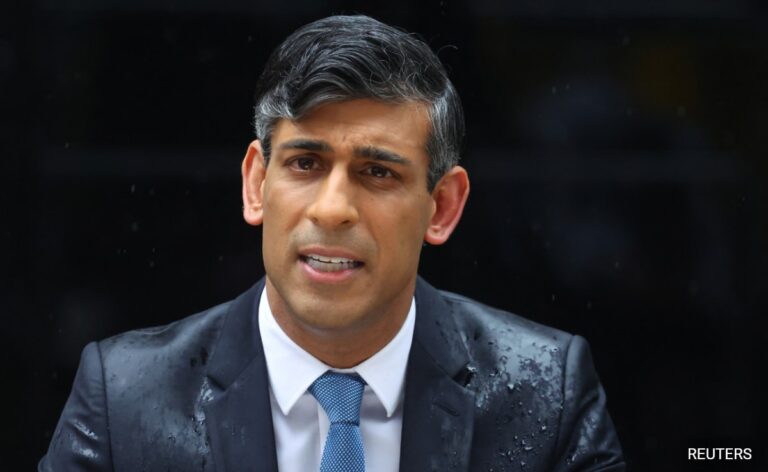
Rishi Sunak succeeded Liz Truss, who was ousted after just 49 days in office. (File)
London:
Britain goes to the polls on July 4 in a long-awaited general election called by Chancellor Rishi Sunak on Wednesday.
The main candidates for the national vote are as follows.
Rishi Sunak
Mr Sunak, 44, was appointed leader of the Conservative Party and eventually prime minister by his own MPs in October 2022, and is seeking a mandate from the British people.
He replaced Liz Truss, who was ousted from power after just 49 days after her tax-cutting economic policies spooked markets and cost her party support.
Mr Sunak, who is of Indian descent, was elected unopposed by Conservative MPs and became Britain’s first Asian and Hindu prime minister.
The former financier is credited with stabilizing the government and halving inflation after the turmoil between Truss and Prime Minister Boris Johnson.
But he has failed to deliver on several promises, including reducing health waiting lists, stopping illegal immigration and sending migrants to Rwanda.
Opinion polls regularly show him having the lowest approval rating of any prime minister in history.
keir starmer
Keir Starmer, leader of the main opposition Labor Party, is a former human rights lawyer and chief prosecutor, and has been told by pollsters that he will win the election and become prime minister.
Mr Starmer, 61, has been credited with returning the party to the center and rooting out anti-Semitism since he succeeded left-winger Jeremy Corbyn as leader in April 2020.
Supporters see him as a pragmatic and safe person ideally suited to help Britain recover from economic decline.
Critics accuse him of being unmotivated and duplicitous, failing to offer a clear vision for the country.
Starmer was born in London to a toolmaker father and a nurse mother. His unusual first name was given to him by his socialist parents in honor of Keir Hardy, the founding father of the Labor Party.
A keen footballer and Arsenal fan, he was knighted by Queen Elizabeth II for his services to criminal justice, but he rarely uses the prefix ‘sir’ before his name. .
Nigel Farage
He has never been an MP and has not yet confirmed whether he will stand, but Eurosceptic Nigel Farage is expected to influence the election either as a parliamentary candidate or as a TV news presenter. ing.
The beer-loving, cigarette-smoking 60-year-old former member of the European Parliament is one of the most polarizing figures in British politics.
He helped persuade the majority of Britons to vote to leave the European Union in 2016, earning him the nickname “Mr. Brexit” from former US President Donald Trump.
He has been hinting for several months that he would probably run for Reform Britain, the right-wing populist party he co-founded in 2018 and of which he is currently honorary president.
Support for the reforms has been around 10% in recent months, and a repeat of this in the polls could cost the Conservatives some of the key seats they need for re-election.
But Mr Farage is a perennial loser, having failed to win seven Westminster elections, and as a high-profile presenter on right-wing channel GB News he may feel he has more influence.
Swinney, Davey, Denyer
Neither Ed Davey’s Liberal Democrats nor John Swinney’s Scottish National Party (SNP) will win the election, but they could have a say in who wins.
Mr Davie, 58, hopes that winning some seats in the south of England can help thwart a Conservative victory as his party aims to overtake the SNP and reclaim third place in Parliament.
Mr Swinney, 60, does not hold a seat in the UK Parliament but was appointed leader of the SNP in May following the resignation of Humza Yousaf and is First Minister in the Scottish Parliament in Edinburgh.
His SNP is struggling to fend off a resurgent Labor Party in Scotland, which could end hopes of independence for a generation.
Green Party co-leader Carla Denyer, 38, is hoping to win a new seat in Bristol Central as fringe parties aim to increase their number of councillors from one to four.
(Except for the headline, this story has not been edited by NDTV staff and is published from a syndicated feed.)

